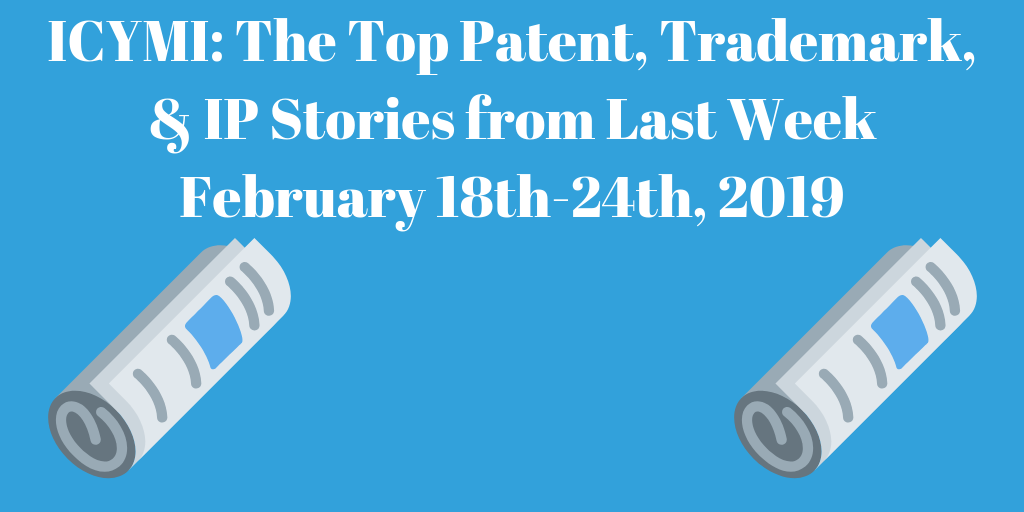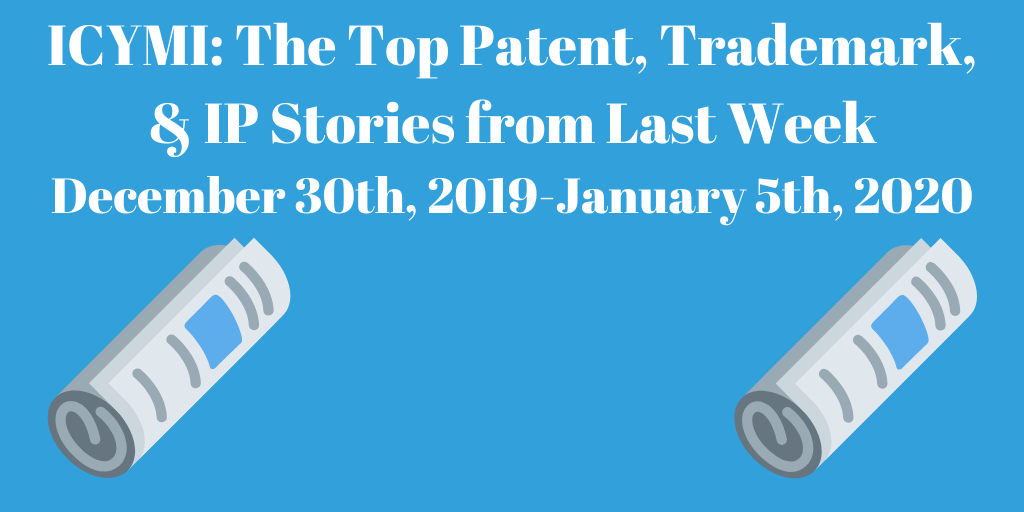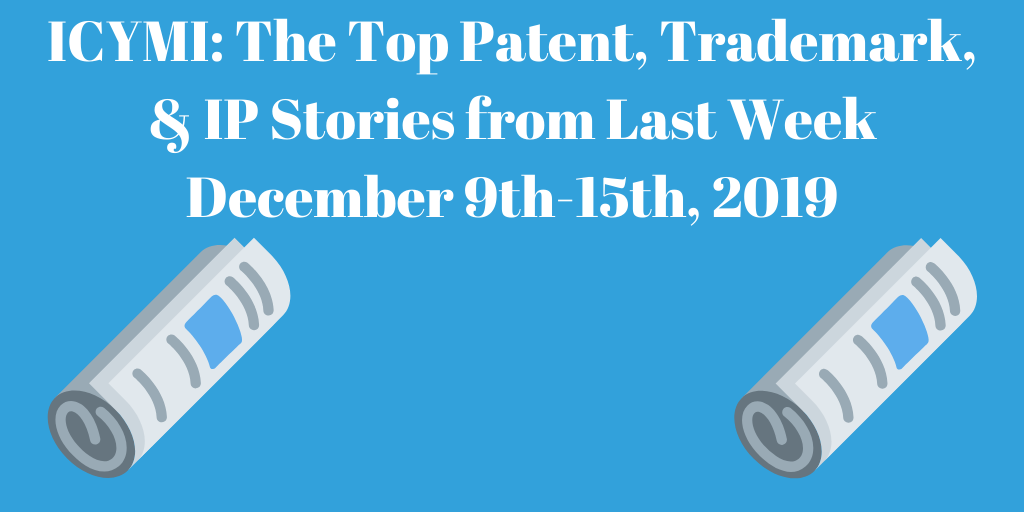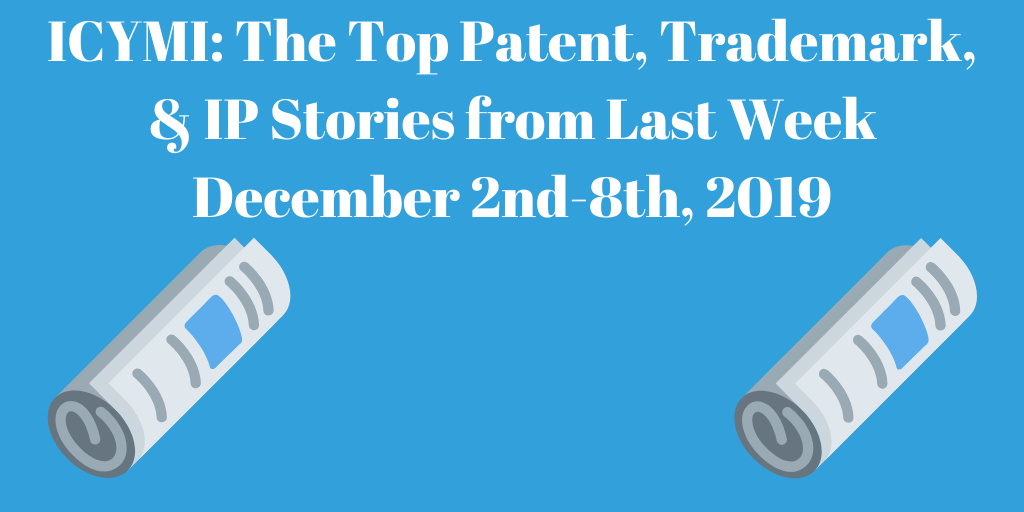Top Patent, Trademark, and IP Stories from Last Week (2/18-2/24/19)
ICYMI: The Top Patent, Trademark, and IP Stories from Last Week (February 18th-24th, 2019)
Every week, we will be highlighting the top patent, copyright, trademark, intellectual property, etc. stories of the previous week in our “In Case You Missed It” segment. The list itself is in no particular order and includes a wide range of stories from the patent world that are informative, noteworthy, or just plain bizarre. The stories included encompass everything from Supreme Court cases to insights into emerging industries. Please feel free to comment your thoughts on the stories or share an important one we missed!
1.) “USPTO Proposes Requirement of U.S.-Licensed Attorney for Foreign Trademark Applicants and Registrants”
The USPTO has proposed new obligations for trademark applicants whose primary place of business is not located in the United States to be represented by a U.S. attorney in good standing. The proposal comes after an increase in applicants abroad “filing inaccurate and possibly fraudulent submissions that violate the Trademark Act (Act) and/or the USPTO’s rules.” The agency believes these filings are being submitted on the advice of individuals “not authorized to represent trademark applicants.”
The USPTO believes such a measure will “instill greater confidence in the public that U.S. registrations that issue to foreign applicants are not subject to invalidation.” Such a move would allow the USPTO to enforce foreign applicant compliance more effectively in trademark disputes.
In FY17, foreign applicants made up 27% of all filings compared to just 19% in FY15. The USPTO believes this growing trend will continue and thus needs to crackdown on foreign parties who attempt to circumvent rules. To read more about this story, click here (via Lexology, February 19th, 2019).
2.) “Why Do Celebrities Trademark Their Babies’ Names?”
The Kardashian-Jenner family has filed an application with the USPTO to trademark their babies’ names (Stormi Webster, True Thompson and Saint, Chicago, and North West). Although it is not illegal to trademark a name, it is not always feasible and requires special consent from the USPTO. Requirements include having a name tied to a widely recognized brand used in marketing or business transactions. Celebrities such as Beyoncé, Rihanna, and Bruce Springsteen have all successfully registered their names as trademarks.
As bizarre as it sounds, they are not the first celebrities to attempt to trademark their babies’ names. Jay-Z and Beyoncé have attempted to trademark their twins’ names “Rumi Carter” and “Sir Carter.” In their applications, the power couple cited commercial use as the basis for their request, with intent to sell everything from fragrances to baby teething rings under them.

The couple also filed to trademark their daughter “Blue Ivy Carter’s” name. In that case, two people unaffiliated with Jay-Z and Beyoncé also tried to trademark the name before Jay-Z and Beyoncé had the chance to. The USPTO promptly threw out the request as it is illegal to trademark a name without a “genuine affiliation” to the person. Essentially, you cannot trademark someone else’s name without their permission.
Jay-Z and Beyoncé have struggled to obtain the trademark for their daughter. In 2013, Beyoncé told Vanity Fair, “People wanted to make products based on our child’s name and you don’t want anybody trying to benefit off your baby’s name.” The couple has struggled to obtain the trademarks because they cannot sufficiently prove they are registering the names for commercial use and not just preventing commercial misuse.
The Kardashian-Jenner family are trying the same strategy, registering the children’s’ names under the children’s products category. To read more about this story, click here (via Yahoo!, February 24th, 2019).
3.) “MilliporeSigma to Be Awarded First U.S. CRISPR Patent”
Last week, biotech giant MilliporeSigma was granted their first U.S. CRISPR-related patent for their proxy-CRISPR technology. Originally published in a well-received 2017 Nature article, the technique has truly ground-breaking implications for researchers. Proxy-CRISPR will build on CRISPR, increasing efficiency, speed, and specificity by opening the genome for DNA modification. Such innovation will allow researchers to alter regions of the genome that would normally be difficult to access. To read more about this story, click here (via Genetic Engineering & Biotechnology News, February 19th, 2019)
4.) “U.S. Cannabis Inventions on the Rise As Legal Marijuana Market Grows”
Despite marijuana still illegal under federal law, the USPTO has been issuing an increasing amount of cannabis-related patents in recent years, albeit rather slowly. In 2018 (through November), Reuters reported there were 39 patents issued containing the word “cannabis,” up from 29 patents in 2017 and 14 in 2016.
With the global demand for cannabis products expected to “exceed $146 billion by the year 2025,” innovators have taken notice. In countries where marijuana is legal, booming research and development of new cannabis products is underway. For example, Canadian cannabis company Canopy Growth spent $1.94 million (CDN) in Q2 2019 on research and development, up nearly 300% from Q2 2018.

As America’s laws become more laxed, experts see a similar potential breakout in cannabis-related patents and inventions occurring in America. “My gut feeling is that inventors will spend more time developing proprietary ways to integrate cannabis extracts into existing products and far less time attempting to obtain patents on unique strains of genetically engineered cannabis,” said chief patent attorney Howard Cohn at THC Legal Group. Everything from cannabis-infused beverages to gum may be the subjects of U.S. marijuana patents one day. To read more about this story, click here (via IP Watchdog, February 19th, 2019).
5.) “DOJ Indictment Reveals Threat of Chinese IP Theft to U.S. Energy Innovation”
The U.S. Justice Department recently indicted a Chinese national for stealing over $1 billion worth of trade secrets from his employer and petroleum giant, U.S. Phillips 66. The crime demonstrates yet another example of China stealing the intellectual property of U.S. companies, making the energy sector its latest victim. Experts say IP theft by China costs the U.S. an estimated “$225 billion to $600 billion a year” and stifles innovation while also forcing companies to compete against their own technology.
As for whether the ongoing trade war will hinder such theft, the short answer is no. China’s use of cyber-enabled theft has only increased during the duration of the trade war. To read more about this story, click here (via Axios, February 22nd, 2019).




